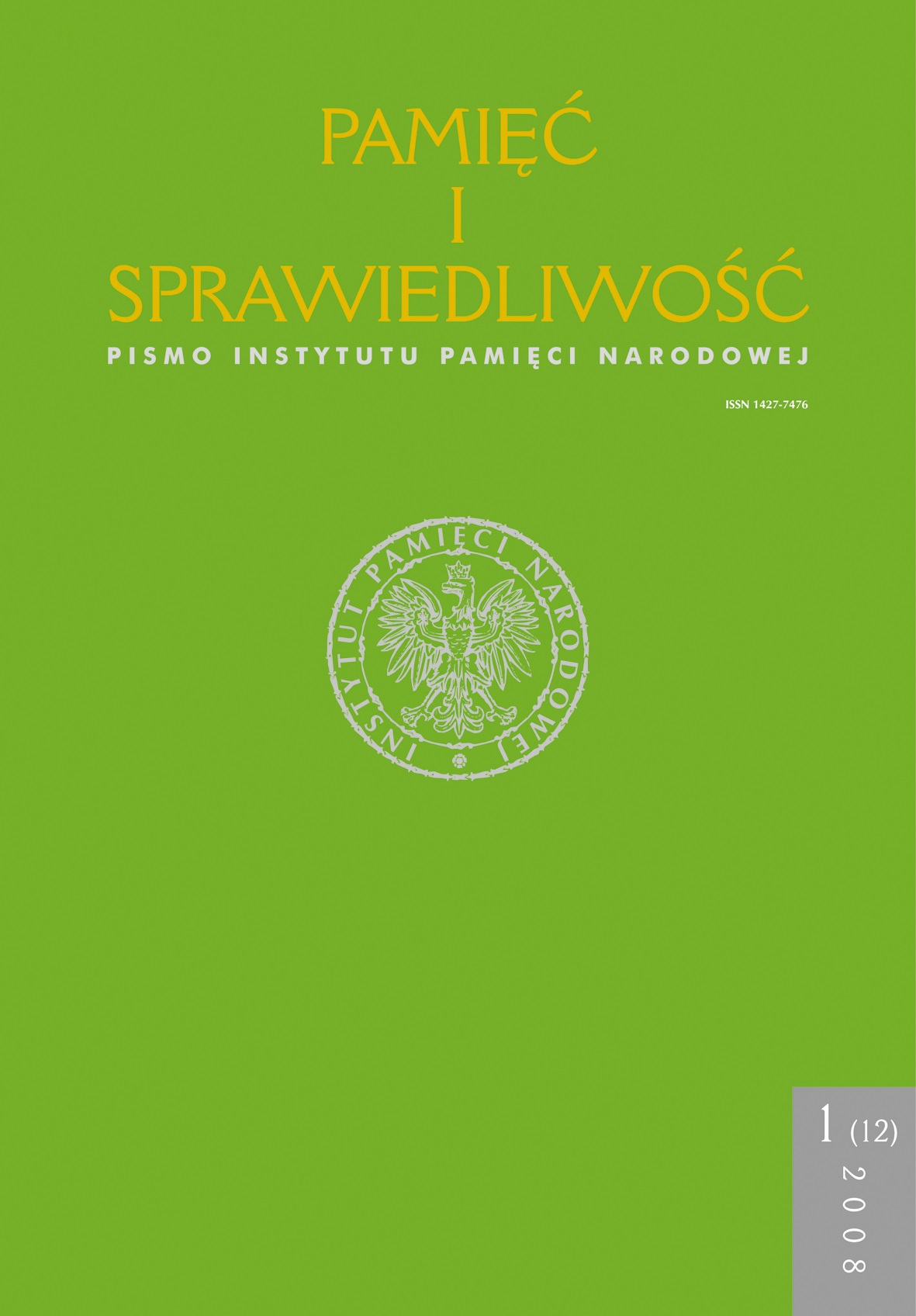Kolaboracja na Kresachm Wschodnich II Rzeczypospolitej 1941–1944
Pamięć i Sprawiedliwość, Tom 12 Nr 1 (2008), strony: 183-197
Data publikacji: 2008-06-30
Abstrakt
Collaboration is a topic arousing many debates and controversies and therefore rather avoided by historians. The assessment of the collaboration in Eastern and Central Europe is hampered by the fact that the inhabitants of those territories lived in between two totalitarian regimes and on numerous occasions they had to chose the lesser evil. That is why many communities deciding to co-operate with the Third Reich fi rst did it because of patriotic motives and only then possibly
ideological ones. Poles for the whole period of the WWII considered Germans their main enemy and that is why the Polish underground always opted against any military co-operation with the Third Reich, even local one in the face of the threat posed by Soviets. In turn, the national Lithuanian, Ukrainian, Belorussian communities perceived the USSR as their main enemy, and treated Germans as a potential ally and even a guarantor of gaining – or regaining – their independence.
That is why when the Germany attacked the USSR in Lithuania and the socalled Western Ukraine the anti-Soviet insurrections broke out. Both the Ukrainian and Lithuanian nationalists created their own governments but they were not recognized by the Germans.
The most vivid example of the collaboration in the eastern Borderlands was the service in the German police formations and SS. Among others the Waffen SS ‘Galizien’ division created in 1943 was composed of Ukrainians. Although such formations were perceived by many people as a substitute for national army, they were a very important element of the German military system. They relieved the Nazi of many duties connected with the participation in anti-partisan or pacification
operations. The Ukrainian, Lithuanian and Belorussian auxiliary police also participated in the extermination of Jews organized by Germans. In turn, Polish units of the police in Volhynia participated in different operations against Ukrainians, but also protected Polish citizens against UPA (Ukrainian Insurgent Army).
However, the decision whether someone was or was not a collaborator cannot be based solely on the membership in one formation or the other but in what way he or she fulfi lled the orders issued by the German authorities. Murdering civilians cannot be justifi ed in any way. That is why whether a given formation committed such murders or not is a decisive factor of its assessment. That is why, among others, the disputes concerning the participation of Ukrainians in suppressing the
Warsaw Uprising or pacifi cation of the village of Huta Pieniacka take on so emotional overtones.
Inne teksty tego samego autora
- Aleksandr Gogun, Anatolij Kentij, Grzegorz Motyka, Anna Madej, [Recenzja] Grzegorz Motyka, Ukraińska partyzantka 1942–1960. Działalność Organizacji Ukraińskich Nacjonalistów i Ukraińskiej Powstańczej Armii, Rytm, Warszawa 2006, ss. 720 , Pamięć i Sprawiedliwość: Tom 12 Nr 1 (2008)
- Paweł Machcewicz, Grzegorz Motyka, [Recenzja] W odpowiedzi Frankowi Grelce , Pamięć i Sprawiedliwość: Tom 6 Nr 2 (2004)
- Piotr Madajczyk, Grzegorz Motyka, Bogdan Musiał, Bożena Szaynok, Eugeniusz Mironowicz, [Dyskusja] Problemy narodowościowe na ziemiach polskich w latach 1939–1989 , Pamięć i Sprawiedliwość: Tom 6 Nr 2 (2004)
- Grzegorz Motyka, Nie tylko likwidacja prowidnyka „Stiaha”. Działania grupy operacyjnej „Lubaczów” w 1947 r. , Pamięć i Sprawiedliwość: Tom 37 Nr 1 (2021)
- Grzegorz Motyka, Iwan Patrylak, [Recenzja] Ukraiński ruch wyzwoleńczy w oczach polskiego badacza (recenzja książki Grzegorza Motyki, Ukraińska partyzantka 1942–1960, Warszawa 2006, 720 s.) , Pamięć i Sprawiedliwość: Tom 13 Nr 2 (2008)
- Wasyl Szpicer, Grzegorz Motyka, [Recenzja] Wasyl Szpicer, Wołodymyr Moroz, Krajowyj Prowidnyk Wołodymyr Tymczij – „Łopatynśkyj”, Wydawnictwo „Afisza”, Lwiw 2004, ss. 256 , Pamięć i Sprawiedliwość: Tom 10 Nr 2 (2006)
- Grzegorz Motyka, Dywizja SS „Galizien” („Hałyczyna”) , Pamięć i Sprawiedliwość: Tom 1 Nr 1 (2002)
- Grzegorz Motyka, Jeszcze o stosunku Polaków do sowieckich partyzantów – byłych jeńców , Pamięć i Sprawiedliwość: Tom 11 Nr 1 (2007)
- Grzegorz Motyka, Służba Bezpeky OUN-B (Służba Bezpieczeństwa OUN-B). Z warsztatów badawczych , Pamięć i Sprawiedliwość: Tom 9 Nr 1 (2006)
 Język Polski
Język Polski
 English
English
 Deutsch
Deutsch
 Français (France)
Français (France)
 Italiano
Italiano
 Русский
Русский


 PDF
PDF
